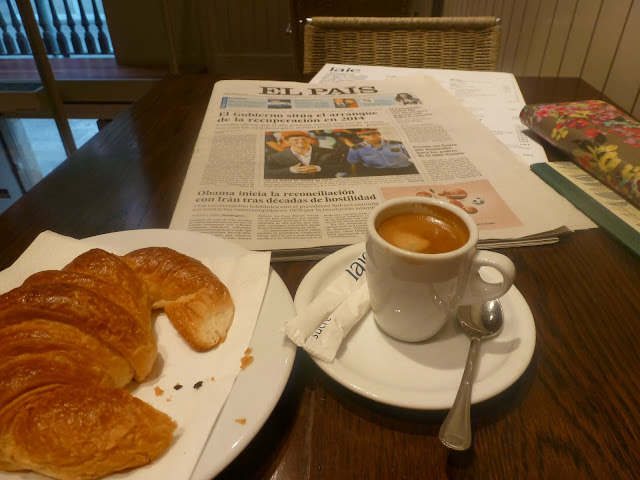To prove to my university that I'm making the most of my experience out here in Barcelona, I have to write an "intercultural competence" report each month. "Intercultural what?" Basically, I have to write a few paragraphs on how much pa amb tomaquet I've been eating, how I've been dressing like the natives, and anything else that I've done to fit in and not be the stereotypically ignorant English tourist. It's a welcome alternative to writing essays on Edmund Spenser, I must say.
This month I've had plenty of cultural experiences to write about, what with all the Spanish celebrations (and days off work) that seem to have been scheduled especially for my arrival in late August. On September 11th "La Diada" was celebrated, which is loosely translated on Wikipedia as the National Day of Catalonia. The day commemorates the defeat of the Catalan troops fighting during the War of the Spanish Succession, and there's a noticeably political resonance to the day's proceedings.
For one, The Catalan Way ('Via Catalana') took place this year: a 480-kilometre human chain in support of Catalan independence. I really wanted to see this (and I handily got the day off work), so my boyfriend and I decided to schedule seeing it into our day. We left late morning to visit Barcelona Zoo, and saw people all over the city already with Catalan flags as capes and t-shirts in the regional colours.
Just as we were leaving the zoo, we heard a loud chanting outside on the streets. A rather confused English couple asked if we knew what was going on, and I explained about The Catalan Way very briefly. "Oh, they must be cheering because they've got the world record for the longest chain, then!" exclaimed the Englishwoman. I decided that explaining the politics behind it wasn't really worth it in this case.
As soon as we left the Parc de la Ciutadella, where Barcelona Zoo is located, we saw where all the noise was coming from. "Ah, that would be the chain then", my boyfriend muttered.
It was a great spectacle seeing all the colours, flags and independence supporters in unison, and there didn't seem to be any negative or violent feeling behind the demonstration. In fact, everyone seemed really cheery and sociable (with the exception of an angry driver who yelled at a section of the chain to move out of her way - in Spanish).
Today, the 24th of September, was another day off work for me. This time it was
La Mercè, Barcelona's biggest festival that celebrates the patron saint of the same name. I was determined to see one of the
castells, or human castles, and set off rather late for the organised event at Plaça Sant Jaume that was planned for 12.30pm. As I walked past Barcelona Cathedral, a crowd of people formed around me. Soon we were all moving very slowly, and as we neared Sant Jaume, the crowd stopped moving altogether. This would be where the
castells were taking place, then.
I could barely see anything from where I was standing, but occasionally the
castell handily moved across the plaça so that it was visible from the alleyway where I was standing (with a million others).
The crowd got more and more cramped, and as people started getting quite angry with each other, my claustrophobia got worse and worse. There was nowhere to move, people couldn't get out the crowd, and some fool had decided to bring a large box of baguettes to try and sell. Just as I was making my way out of the increasingly distressed crowd, I turned around and saw the castell. "Should I take a photo, or is this a completely inopportune moment?" I thought, as people around me were pushing and shoving more and more. My impulsive side led my decision-making, and I left the Barri Gòtic with this out-of-focus, yet not atrocious, photo.
Maybe next time I'll just find one of the castellers' training sessions to take photos of...


























